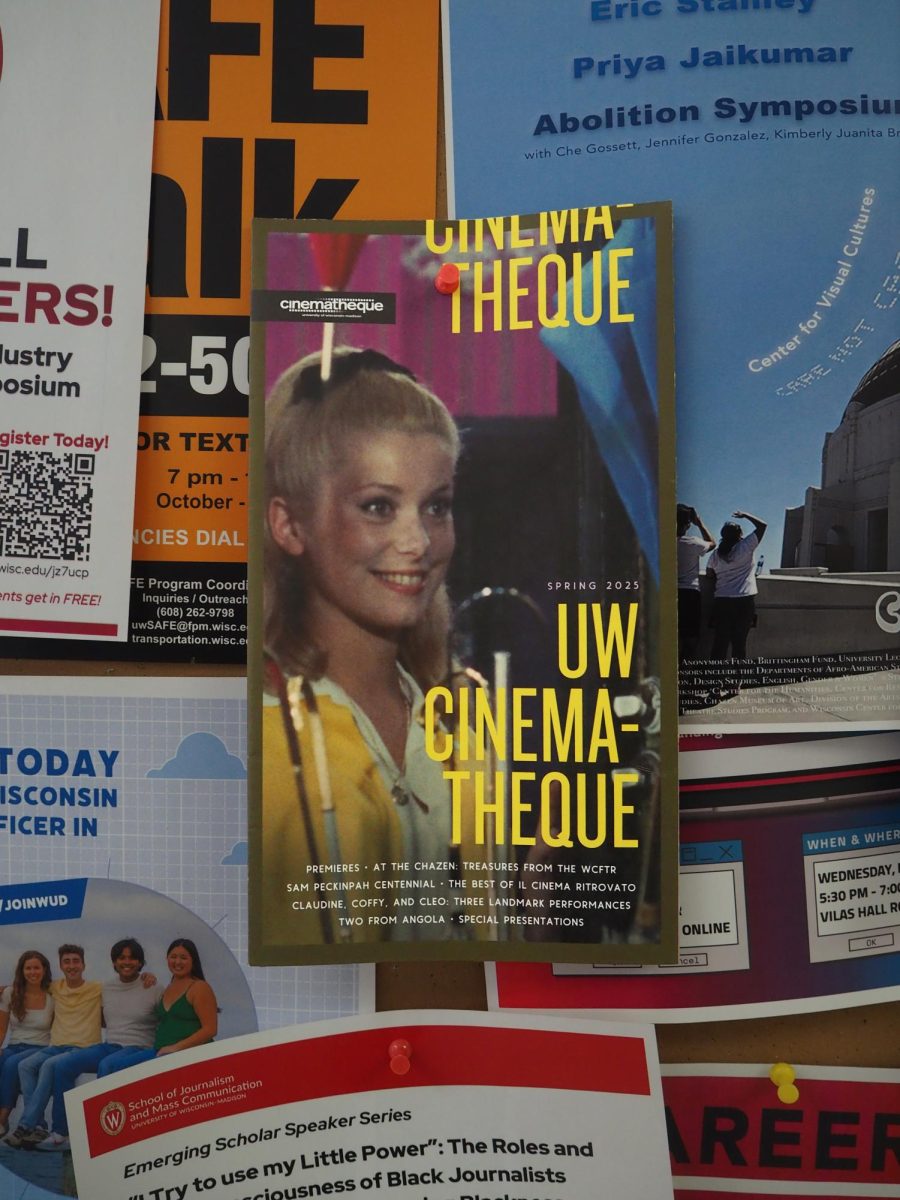The University of Wisconsin’s Cinematheque debuted a new film series, “Two from Angola,” in collaboration with the African Studies and Latin American, Caribbean and Iberian Studies programs. The series features two contemporary Portuguese language movies from Angola in recognition of the 50th anniversary of Lusophone Africa’s independence from Portuguese rule in 1975. Produced by Angolan filmmaker collective Gerção 80, translating to Generation 80, “Our Lady of the Chinese Shop” and “Air Conditioner” — both set in the capital city of Luanda — shine a light on the social and political issues impacting the nation.
A jewel unique to UW, the Cinematheque provides the public with the opportunity to experience films from around the world they would otherwise never get the chance to see. Alongside the Angolan film series, the Spring Series 2025 premieres a variety of new international movies as well as classic cinema from around the globe.
“It is important for people who only know cinema through Hollywood to know that you can be just as emotionally affected and moved by a film from Africa, or the Middle East or Central Asia,” UW Cinematheque director of programming Jim Healy said.
When recognizing history obscure to the general American audience, cinema becomes an especially powerful tool in communicating the complexity of modern-day Angola and its ties to colonial influence.
Though the films are separate stories, directors Ery Claver (“Our Lady of the Chinese Shop”) and Fradique (“Air Conditioner”) played collaborative roles in each other’s projects with their differences and similarities making for a fascinating view experience. Healy believes cinema makes space for global connection and collaboration.
“Human behavior and expression [are] recognized by other humans, no matter where they are from,” Healy said.
Both LACIS and the African Studies Program played a role in bringing this series to the UW community. The program allocated resources to bring these Angolan films to the forefront, LACIS Associate Director Alberto Vargas said. LACIS hopes to highlight the continued legacies of imperial-era Portugal and the cultural impacts in the region. Portuguese remains the official language in Lusophone Africa and Christianity persists as the dominant religion in Angola and other nations. Vargas admits that stories of African nations and the Global South are incredibly overlooked in the U.S.
“We ignore history to our own peril,” Vargas said. “Currently, African countries are gaining global relevance, have important mineral resources and are attracting the attention of other global actors, such as China and Russia. It will be beneficial to the U.S. to learn from history and also cultivate collaboration with the Global South.”
African Studies Program Faculty Director Marissa Moorman is a leader in Angolan Studies and has heralded the production of this small film festival and other events on the 50th anniversary of liberation. Both films in the series were made by directors from the media collective Gerção 80, as the founders were born in the 1980s following Angolan independence. According to Moorman, the Angolan government hoped to support film production post-independence, but the outbreak of civil war halted any cinema till the war’s end in 2002.
A tightly knit community, Gerção 80’s innovative filmmaking includes flipping profits from small commercial productions into budgets for feature films. The crew has taken on various roles, from directing to cinematography to encouraging film-viewing culture in Luanda through movie nights and discussions in their office space.
Angola, Cape Verde, Guinea Bissau and Mozambique fought Portugal for ten or more years to win independence, and, in Angola and Mozambique, decades-long civil wars followed freedom, creating deep craters in every aspect of life. Despite not remembering colonialism, the young and growing population of the African continent has been demanding betterment through economic and political change that the legacy of imperialism shaped.
“The legacies of colonialism have to do with the uneven ways in which African economies are integrated into the global economy on unequal terms. The borders of present-day countries don’t correspond to the borders of earlier kingdoms and the lack of recognition of African languages in the Lusophone region,” Moorman said.
“Our Lady of the Chinese Shop” played at the Cinematheque on Feb. 15. A grieving mother, a barber turned cult leader and a man searching for his missing dog all find themselves connected to a mass-produced Virgin Mary doll, imported by a Chinese merchant. The film explores the complexities of modern-day Angola, hopeful for a brighter future but held back by colonial history and current economic imperialism from China.
The film’s structure reflects this fraught nature as it is split between many characters, each showcasing a different side to life in Luanda — the African, the Portuguese and the foreign. With nothing left in black and white, Claver shows the multitudes of Catholicism as both a chain and a glimmer of hope. The open-ended and cacophonous nature of “Our Lady of the Chinese Shop” showcases the contradictory realities of contemporary Angola.
Playing at the UW Cinematheque on Feb. 22, “Air Conditioner” delved into the surrealist, Afrofuturist genre as air conditioners mysteriously fall out of Luanda’s buildings amidst sweltering temperatures. Mundane mixes with the supernatural as security guard Matacedo embarks on a quest to retrieve a broken air conditioning unit for his boss. With a lively jazz score, “Air Conditioner” explores the heart and trauma of the vibrant city of Luanda.
The “Two From Angola” series was a work of collaboration from numerous parts of the UW faculty. African Studies Associate Director Aleia Ingulli McCord believes the beauty of this symbiosis is unique to Madison.
“Honestly, there is probably no other campus in the country that could put a program like this together,” McCord said. “Our campus is fortunate to have over 90 faculty who study Africa, including a number who work in Portuguese-speaking Africa, which is often underrepresented in the field of African Studies. The series reflects the unique expertise and professional networks of our outstanding faculty, and our campus is so fortunate to have these kinds of connections to the wider world.”


